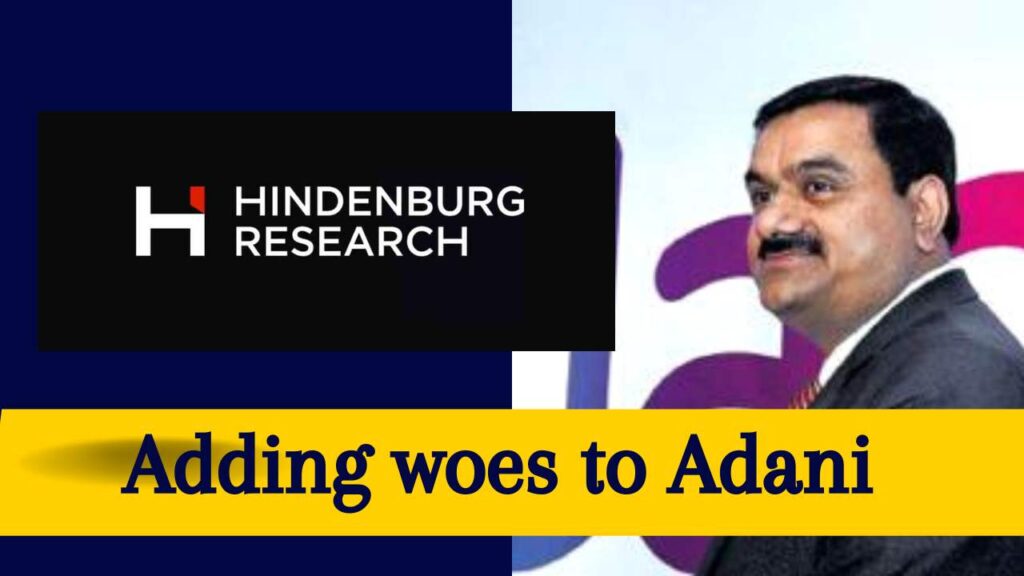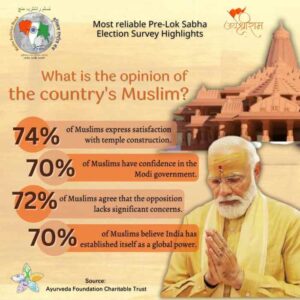Adding woes to Adani

India is one of the world’s fastest expanding economies, thanks to new entrepreneurial brains and established corporate tycoons. India’s enterprises are as broad as the country itself. Hence when we talk about business we have many prominent names/brands that float in front of us but, certain names not to forget would be Reliance – at present run by Mukesh Ambani, Tata- at present run by Ratan Tata, Infosys- at present run by Narayan Murthy and last but not the least , the tycoon of all tycoons and the goliathic business Adani group of industries- at present run by Gautam Adani.
Gautam Adani is Asia’s richest man and the world’s third richest person. A quick explanation would be that throughout the COVID-19 outbreak, when all commercial establishments were facing economic loss, the Adani industries still managed to navigate a prosperous road. As a result, Gautam Adani will have attained such a high position by 2023. His achievement, however, did not endure long. The rate at which Adani Industries soared to its peak is the same rate at which it collapsed. But why is this so? Why did Adani Industries suffer such a setback?
The answer to the above will be the Hindenburg report. Nathan Anderson started Hindenburg Research LLC, a New York-based investment research firm focused on activist short-selling, in 2017. The firm, named after the 1937 Hindenburg tragedy, which they define as a man-made avoidable disaster, creates public reports alleging corporate fraud and misconduct via their website. Hindenburg Research develops an investigation report on a target firm in six months or more by reviewing public records and internal corporate papers and interviewing employees.

The Adani Group report by Hindenburg Research, released in January 2023, is a critical examination of the Indian conglomerate’s financial and operational procedures. The research has ignited a heated debate about one of India’s major businesses’ business practises, raising serious concerns about the ethics and legality of Adani Group’s operations. According to the Hindenburg study, Adani Group employed aggressive and unusual accounting procedures to increase profits while understating debt. According to the research, the corporation has booked huge sums of revenue from subsidiaries and joint ventures that are not consolidated in its financial accounts, creating an inaccurate impression of the company’s financial health and profitability. Aside from these financial difficulties, the Hindenburg report charges Adani Group of insider trading and tax violations. The report cites papers received from Indian government and regulatory bodies as evidence that these allegations are true.
The report also attacks Adani Group’s environmental practises, accusing the corporation of large-scale deforestation, causing harm to vulnerable ecosystems, and polluting groundwater and air. According to the report, Adani Group has neglected local residents’ concerns and has violated environmental standards. The Adani Group has categorically refuted the charges in the Hindenburg investigation, labelling it “baseless and libellous.” The company has stated that it complies fully with all Indian rules and regulations, and that it operates under the greatest ethical and environmental standards.
The Hindenburg study has already had an effect on Adani Group’s stock price, which has plummeted since its publication. The report has also ignited a broader debate about Indian corporations’ business practises and the need for greater openness and responsibility.

Highlights from the Hindenburg Research research on Adani
● Overpriced shares – The research claims that Adani shares are extremely overvalued by traditional metrics such as P/E ratio, Price/Sales ratio, and EV/EBITDA, citing data from FactSet and Hindenburg’s own analysis. Some extreme cases are Adani Enterprises’ P/E ratio being 42 times the industry average and Adani Total Gas’ Price/Sales ratio being 139.3 times the industry average of 1.0x, among others.
● Limited adherence – According to the study, one of the organisations hired to bookrun Adani Green Energy has a history of issues with the SEBI. Furthermore, one of the independent auditors appointed to audit Adani Enterprise and Adani Total Gas appears to be a too tiny organisation with professionals who are too young to perform the auditing of such a diverse range of enterprises.
● Heavy promotional ownership of stocks – It has been claimed that, in addition to the already large amount of promoter holdings in shares (almost 74% in various cases), considerable portions of the remaining public shares are also held through shell firms with ties to the Adani group. Many of these companies have a huge majority of their shares invested only in Adani Group entities. This could imply that those corporations have found a method around the SEBI rule that requires at least 25% of a listed company’s shares to be held by the public. This puts these companies at risk of being taken down.
● Doubts about the management team – According to the investigation, certain members of the management have a questionable record, including allegations of fraud, duty evasion, frauds, and so on.
● Hyped demand – The prior statement also alluded to deliberate pumping of Adani stock prices by excessive buying pressure from organisations that appear to be prejudiced towards (or potentially affiliated with) the Adani Group itself. It is stated that the delivery volume of Adani equities was high due to wash trading (the purchase and selling of a share by the same or linked organisations to inflate the trading volume data). The Hindenburg report also raised rumours about the involvement of notorious stock scammer Ketan Parekh.
● Promoters dedicating their assets – This signifies that the company’s promoters have taken on current liabilities based on the shares they possess. As previously said, the share price is said to be already high, as is the debt; so, promoters guaranteeing stocks to take on further debt is not a sound economic practise in this context.
The industrial angle on the Hindenburg report and Adani industries seems to be a high tensioned angle. On one hand where we learnt how Hindenburg has published it’s reports and what have been it’s results , on the other hands we learnt the reaction of Adani Industries on the same.
Now, most important is to know how the above has affected the investors and how did they respond to the Adani fallout.
Seven listed Adani Group firms lost almost $10.73 billion in market value on January 25th, following the release of the Hindenburg report. The Adani Enterprises FPO may have suffered as well, as the price was hanging around Rs 3 thousand plus in the early hours of its opening day, which is near to the lower end of the price band of Rs 3 Crore plus per share.
Retail investors may not need to be concerned about the entire Adani Group Hindenburg incident since, in the grand scheme of things, the Adani Group may be deemed a ‘too big to fail’ organisation by some. Allegations and legal suits come and go, but if you believe a stock is fundamentally strong or poor based on your own measures, you may choose to remain with your judgement. The better option to proceed is to critically analyse any foundational and price information and make an unbiased judgement based on returns and timescale. If the preceding scenario piqued your attention, you might be interested in reading more of our blogs and financial material.
By- Asmita Roy








